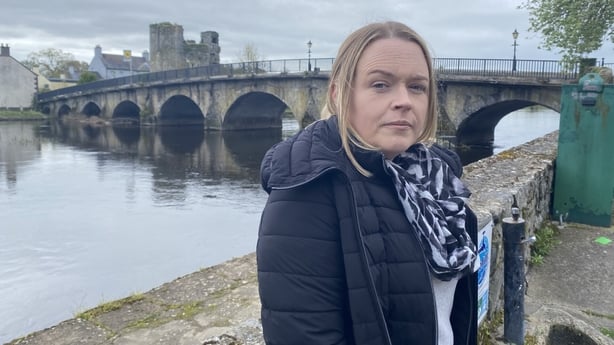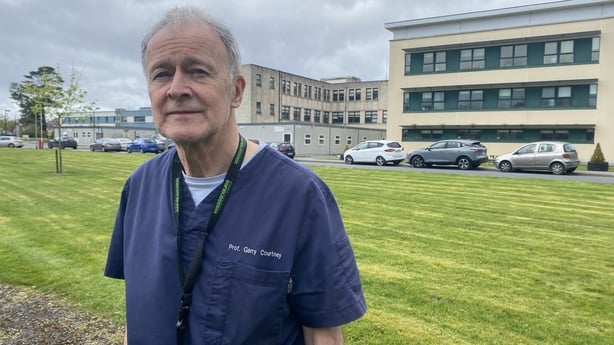Leah Barron from Co Carlow was diagnosed with Type 1 diabetes four years ago, at the age of 15. Her little sister Emily, aged nine, got the same diagnosis earlier this year.
The difference between the two when it comes to treatment for the same condition?
Leah, who is currently preparing for her Leaving Cert, is on an insulin pump which automatically monitors, regulates and delivers the correct amount of insulin to ensure she doesn't get sick and can eat with freedom.
Emily is on up to seven injections a day to also prevent her lapsing into sickness, and has to have her meals strictly monitored and timed.
The Barron family had hoped that Emily would also be put on an insulin pump to make life much easier, but that has not happened and there is no sign of it happening through their clinic at St Luke's General Hospital in Kilkenny, according to her mother Gillian.
"At the moment we spoke to the hospital and they don't have a pump service any more, due to staff shortages and we were just horrified," Gillian said.
We need your consent to load this rte-player contentWe use rte-player to manage extra content that can set cookies on your device and collect data about your activity. Please review their details and accept them to load the content.Manage Preferences
"We weren't given other options. The thought, then, that we'd have to stay on injections, especially when she can see her older sister is on a pump and the difference that has made to her," she said.
For the foreseeable future, Emily will have to remain on a strictly-monitored regime.
"Basically every bit of food Emily eats, we have to count the carbohydrates in that and then we have to match it to a level of insulin and inject that before she eats.
"So she could have anywhere from four to seven injections a day, and it's tough, it's not easy. She's very good, she takes it all in her stride, she's very good with it, but for a nine-year-old child it's an awful lot, it's a huge lifestyle change," Gillian said.
Emily would have to be assessed for suitability for a pump and training and that would take months, but part of the frustration is not even having a date or rough timeline for when that assessment and training could begin, according to Gillian.
St Luke's Hospital in Kilkenny is one of a number of hospitals which has had its diabetes service, including at paediatric level, disrupted in recent months because of staff departing and the time-intensive task of recruiting - and training for what is very specialised work - replacement nurses.
Others include at Letterkenny University Hospital and Regional Hospital Mullingar, although parents and children who use the latter hospital for their diabetes service are hopeful things will resume as normal in the coming weeks.
Staff shortages have affected up to 145 patients of the clinic in Mullingar but extra steps are being taken to continue services in the coming weeks, while longer-term solutions are being worked out.
Taoiseach Simon Harris was asked about the Mullingar situation in the Dáil earlier this week and said "there is a scarcity of specialist-trained paediatric nursing staff" which has "posed significant challenges" to the continuity of services in recent years.

However, it is understood this weekend that there are hopes the clinic in Mullingar will return next week.
For St Luke's in Kilkenny, it's likely to be September before "normal service" is back although families have no specific dates as to when their patients may be offered pumps and, just as important, training in their use or assessment for suitability in some cases.
"You're left with nothing and that's very, very difficult because the pump makes such a difference to kids," said Avril Glennon whose son Aaron was diagnosed with Type 1 diabetes in 2022 and is now 13.
"My friend's son - he's a Type 1 as well and he has a pump and it's completely different. It's what these kids deserve, they deserve to have this treatment. It's life-changing for them and they deserve to have it," she said.
She realised that Aaron would not be getting the pump in the near future when she rang the clinic in Kilkenny two weeks ago and was told there was no set date, and then she found out by speaking to another parent.
"I rang and they confirmed it, it was gone. We were left in limbo, nowhere to go," she says, adding that the children's hospitals in Dublin are not an option at the moment because their lists are full for the service.
"It's five, six injections a day," she said of Aaron's routine.
"He takes a long-acting insulin at night-time and that's a painful injection and then he'll have his short-acting injection during the day, so he's missing school because he has to come out of class to take his insulin before he eats.
"Like I've had teachers saying he's missing class and he can't be doing this in secondary school, but I mean his diabetes has to come first, his health has to come first," she said.

She said it is "disheartening" for Aaron himself, not knowing when he may get an insulin pump.
"It would make his life easier. He'd have this pump attached and just programme in the carbs and not have to be worrying about taking the injections in public, or when you're out or with your friends. He's 13 and getting into those formative years of his life and he deserves to have it made easier, as does every child in Carlow and Kilkenny," she said.
Clinical director at St Luke's Hospital Professor Garry Courtney said it is a "very unfortunate situation" that has arisen in Kilkenny.
"We have about 74 children who need insulin pumps, half of them are on insulin pumps already and the other half are being assessed," he said.
Not all will need pumps, he said, but the hospital is "very sorry" for the current delays to the service.
"We have suspended the service because we've only seven specialised nurses, for diabetes, who do children and adults, and two of them have left recently and we're recruiting, we have recruited, successfully, replacements but they have to be trained because it's a very specialised service," Prof Courtney explained.
The hope is that some patients will be put on the pump in July, more in August, and that the service will have cleared its backlog by September.
Asked about families who have no set date for when their children may start training on an insulin pump, he said: "That's very regrettable but at the moment we're training our nurses. That's a very specialised job."
In a statement to RTÉ News, advocacy group Diabetes Ireland said the situation is "another example and illustration of under-resourcing in hospital-based diabetes teams" and how the lack of health services planning, the absence of diabetes registries and audits and "no national strategy" affect people living with diabetes.
The group wants a task force established to develop a national diabetes strategy, to avoid future issues.
In the meantime, it is a waiting game for families.
"It's just heartbreaking," Gillian Barron says, "because Emily has to go every day getting injections with us knowing she might not get a pump like Leah has, something that could make a big change to her. It’s heartbreaking".





